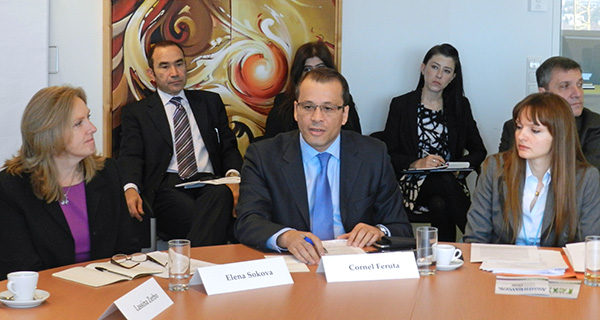

The International Workshop on Disarmament and Non-Proliferation Education and Capacity Development was held in Vienna on 14-15 November 2013 at the Vienna Center for Disarmament and Non-Proliferation (VCDNP). The event was co-organized by the VCDNP and the Organisation for the Prohibition of Chemical Weapons (OPCW), with the support of and in partnership with the Foreign and Commonwealth Office of the United Kingdom, the Federal Ministry for European and International Affairs of Austria, the Comprehensive Test Ban Treaty Organization (CTBTO), the Permanent Mission of Norway to International Organizations in Vienna, and the Carnegie Corporation of New York.
Education and training are fundamental to continuing global progress on disarmament and non-proliferation, as pointed out in the United Nations Study on Disarmament and Non-Proliferation Education (A/57/124). According to this study, "[t]he overall objective of disarmament and non-proliferation education and training is to impart knowledge and skills to individuals to empower them to make their contribution, as national and world citizens, to the achievement of concrete disarmament and non-proliferation measures and the ultimate goal of general and complete disarmament under effective international control."
The workshop brought together practitioners in the field of disarmament and non-proliferation education, particularly from international organizations, as well as experts from selected leading academic centers and professional networks. The workshop provided an opportunity for this broad range of professionals to share experiences and best practices—particularly with regard to specific tools and methods—and to explore potential collaboration and synergies between international organizations and other key stakeholders in the areas of disarmament and non-proliferation education and training, awareness-raising, and outreach.

In a keynote speech, Dr. Lassina Zerbo, executive secretary of the CTBTO, emphasized the universal importance of non-proliferation and disarmament, arguing that all members of the global community must be engaged in such initiatives. Dr. Zerbo asserted that disarmament and non-proliferation education issues should not be taught as though they are independent of the global framework, and that international organizations, NGOs, and academia must work together through integrated and synergistic training and capacity building.
Mr. Attila Zimonyi, director of strategy and policy at the OPCW, noted that the achievements of the OPCW, honored by its selection for the 2013 Nobel Peace Prize, would not have been possible without success in the global disarmament movement. Mr. Zimonyi called upon state parties to raise awareness among scientists and engineers of the dual-use nature of their work by reaching them early in their training. He pointed to the OPCW Temporary Working Group on Education and Outreach as an example of a forum that allows an exchange of information and best practices, and suggested that the use of common tools, techniques, and methods could assist in education and training initiatives.

Mr. Cornel Feruta, Chief Coordinator in the International Atomic Energy Agency Director General's Office for Coordination, thanked the VCDNP for playing an important role in disarmament and non-proliferation education, and underlined the important role that civil society plays in such education, including by stimulating governments to keep education on the non-proliferation and disarmament agenda. He referred to the practical work and important contribution of the IAEA, highlighting activities in the non-proliferation and nuclear security areas.
Following these remarks, participating organizations and experts provided brief overviews of the relevant work being done by their respective organizations. The workshop also featured several panels, during which presenters gave more in-depth information about the work of their organizations and provided detailed information on specific tools, methods, and practices. Each panel was followed by an active discussion during which participants exchanged information on not only what their programs do, but also how the programs are implemented and why such methods or tools were chosen.

Throughout the discussion, participants often noted many challenges to improving disarmament and non-proliferation education, discussing also many related opportunities and offering relevant recommendations. Several themes emerged within these discussions, including issues of audience, framing and scope, funding, program management and leadership, promotion, synergies and collaboration, sustainability, and tools and methods.
In response to the many challenges and solutions discussed, participants made numerous recommendations for next steps to improve disarmament and non-proliferation education and training, including steps that would: 1- improve and increase contacts and communication among relevant organizations, including international organizations, non-governmental organizations, and academia; 2- increase project cooperation to maximize efficiencies, decrease duplication of efforts, and avoid gaps; and 3- raise the profile of disarmament and non-proliferation education.

In addition to these next steps, participants pointed to the thirty-four recommendations to "promote education and training in disarmament and non-proliferation at all levels of formal and informal education" contained in the 2002 United Nations study (A/57/124). Despite the progress that has been made in the implementation of the study, participants agreed that several recommendations have not been implemented at all, while many recommendations have room for continued progress.
By continuing to use the site, you agree to the use of cookies. more information
The cookie settings on this website are set to "allow cookies" to give you the best browsing experience possible. If you continue to use this website without changing your cookie settings or you click "Accept" below then you are consenting to this.